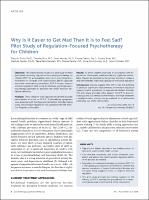Please use this identifier to cite or link to this item:
https://hdl.handle.net/20.500.12202/10069| Title: | Why is it easier to get mad than it is to feel sad? Pilot study of Regulation Focused Psychotherapy for Children |
| Authors: | Prout, Tracy A. Rice, Timothy Murphy, Sean Gaines, Emma Aizin, Sophia Sessler, Danielle Ramchandani, Talya Racine, Emma Gorokhovsky, Yulia Hoffman, Leon 0000-0002-3650-5890 |
| Keywords: | Anger Sadness Attention Deficit and Disruptive Behavior Disorders/*psychology Attention Deficit and Disruptive Behavior Disorders/*therapy Psychotherapy/*methods Child, Preschool Humans Male Pilot projects Disruptive Impulse-control Oppositional Defiant Disorder Psychodynamic Psychotherapy Conduct disorders |
| Issue Date: | 1-Mar-2019 |
| Publisher: | American Psychiatric Association |
| Citation: | Prout, T. A., Rice, T. R., Murphy, S., Gaines, E. Aizin, S., Sessler, D., Ramchandani, T., Racine, E., Gorokhovsky, Y., & Hoffman, L. (2019). Why is it easier to get mad than it is to feel sad? Pilot study of Regulation Focused Psychotherapy for Children. American Journal of Psychotherapy, 72(1), 2-8. doi:10.1176/appi.psychotherapy.20180027 |
| Series/Report no.: | Am J Psychother .;72(1) |
| Abstract: | •Objective:: This article reports results of a pilot study of three participants receiving regulation-focused psychotherapy for children (RFP-C), a manualized, short-term, psychodynamic treatment for children with oppositional defiant disorder and other externalizing problems. RFP-C targets implicit emotion regulation while using an intensive, psychodynamic, play therapy approach to decrease the child's need for disruptive behaviors. •Methods:: Three children with oppositional defiant disorder participated in a trial of RFP-C. Externalizing symptoms were assessed with the Oppositional Defiant Disorder Rating Scale, and emotion regulation was assessed with the Emotion Regulation Checklist. •Results:: All three children improved in accordance with expectations. Participants exhibited clinically significant and reliable change, as assessed by the primary symptom measure, and demonstrated improved capacity for emotional regulation. •Conclusions:: Results suggest that RFP-C has the potential to produce significant improvements in emotion regulation capacity and in symptoms of oppositional defiant disorder. This pilot study provides initial support for RFP-C as an efficacious and cost-effective intervention, with high treatment compliance rates, and lays the groundwork for a randomized controlled trial of the intervention. |
| Description: | Scholarly article / Open access |
| URI: | https://psychotherapy.psychiatryonline.org/doi/epdf/10.1176/appi.psychotherapy.20180027 https://hdl.handle.net/20.500.12202/10069 |
| ISSN: | 0002-9564 |
| Appears in Collections: | Ferkauf Graduate School of Psychology: Faculty Publications |
Files in This Item:
| File | Description | Size | Format | |
|---|---|---|---|---|
| prout-2019-OA why-is-it-easier-to-get-mad-.pdf | 588.26 kB | Adobe PDF |  View/Open |
This item is licensed under a Creative Commons License

